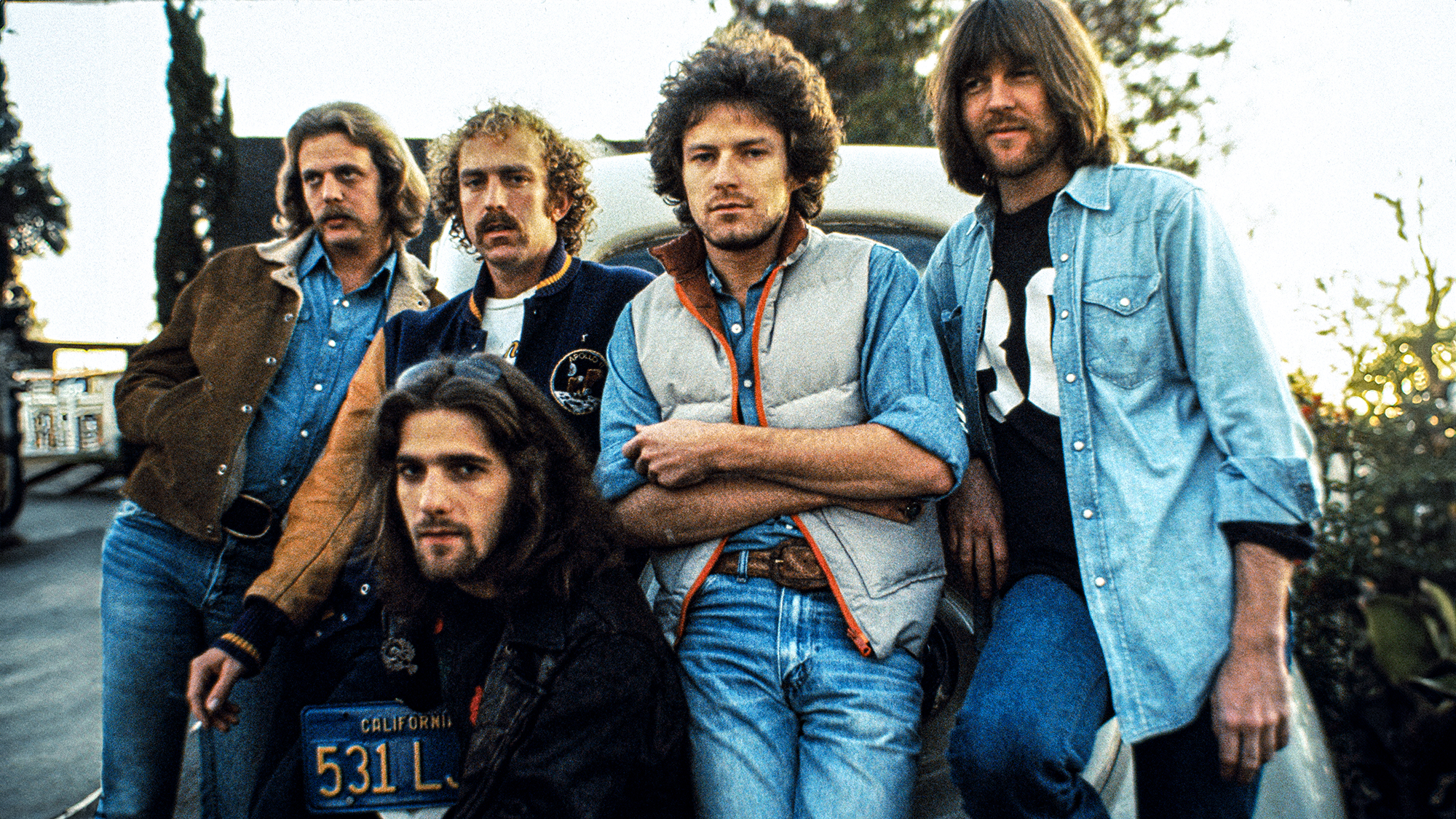
All the latest guitar news, interviews, lessons, reviews, deals and more, direct to your inbox!
You are now subscribed
Your newsletter sign-up was successful
“I learn so much from other players,” says acoustic guitarist extraordinaire Tommy Emmanuel.
Emphasizing that point, he lets us in on a little secret: “I even steal from them.” He laughs. “No, really, it’s what we do, all of us. You have to have your antenna up all the time.
“If I spend a few minutes with people like Jack Pearson or Steve Vai, they’ll do things that just knock me out. Before you know it, I’m playing the same licks, but I make them mine. And that’s okay. It’s part of the musical dialog we have as musicians.”
Although he’s recorded dozens of albums of his own material, Emmanuel constantly finds new inspiration in reworking other people’s material.
On his new EP, Accomplice Series Vol. 3 (CGP Sounds), a duet with British acoustic virtuoso Mike Dawes, he tackles songs such as Sting’s “Fields of Gold,” John Mayer’s “Slow Dancing in a Burning Room” and Nirvana’s iconic alternative rock smash, “Smells Like Teen Spirit.”
“It’s always an adventure taking a famous song like ‘Smells Like Teen Spirit,’ which had such power from electric guitars, and transposing it for acoustic guitar,” Emmanuel says. “I had such a good time working out Kurt Cobain’s vocal melody for an acoustic.
“I found these various bends and vibratos and these funny little chord parts. I was basically the lead singer through my guitar. You find yourself doing things you might not do with your own music when you rework certain tunes.
All the latest guitar news, interviews, lessons, reviews, deals and more, direct to your inbox!
“I recommend people try it.”
Here, Emmanuel offers six more tips for players…
1. Choose Songs That Spark Your Creativity
“For me, everything starts with a good song. Obviously, ‘good’ is subjective. You might think a song is good, while another person thinks it’s the worst thing he’s ever heard. That’s okay. That’s what makes the world go ’round.
A good song is something you can play that allows you to be creative and emotional, and take the listener on a journey
Tommy Emmanuel
“To me, a good song is something you can play that allows you to be creative and emotional, and take the listener on a journey. A good song is a place where you can investigate various aspects of your personality, and inevitably you’re going to use that as a springboard for your guitar playing.
“Very frequently with songs I cover, I find myself playing things that might never have occurred to me. It’s almost like I’m the collaborator with the original writer. It allows you to put your own stamp on somebody else’s songs.
“This morning I played ‘She’s a Woman’ by the Beatles, and I put all sorts of licks into it that aren’t on the original. That’s what a good song does – it sparks your creativity.”
2. Develop Confidence in Your Feel
“It can take years to get your timing and groove together. It’s like a muscle memory that you have at your immediate recall. Without it, you’ll be speeding up and slowing down when you play, and that drives people crazy.
If you’re not using a metronome, get to it immediately
Tommy Emmanuel
“If you’re not using a metronome, get to it immediately. It will improve your playing almost from day one, and people will want to listen to you and play with you.
“I was probably 30 years into my playing when I realized I should use a metronome. What did it for me was working with drummers who were really good. Their timing was immaculate, but I wasn’t syncing up with them properly. I still had all this childish enthusiasm, and I was playing all over everything.
“Around the same time, I listened to myself on a record, and I was kind of crushed. I had to admit that I was trying to show off too much, and I wasn’t listening to the other players. After that, I got myself a date with a metronome, and we’ve been in a serious relationship ever since.”
3. Find Your Guitar’s Sweet Spot
“When you play an acoustic, you’ll find there are places on the guitar where the voices sound better than in other spots. You can adjust your picking hand an inch one way or the other, and everything will sound different.
Don’t settle for a bad sound. If something is a little off with your tone, figure out why
Tommy Emmanuel
“And if you really pay attention, you’ll find that one particular spot for whatever you want to play – chords, a lead, whatever – and suddenly the clouds open up and everything is beautiful. And that will inspire you to play and be creative.
“Don’t settle for a bad sound. If something is a little off with your tone, figure out why. It could be that your guitar needs some work. The intonation might be off, or maybe you need different acoustic guitar strings.
“There could be a lot of reasons why your sound isn’t giving you what you need, but do the work and investigate what’s wrong. In the end, you’ll make better music, and you’ll be a better player.”
4. Don’t Just Use a Tuner – Use Your Ears as Well
“This sounds so simple and basic, but it’s quite important and should be taken seriously. First off, find out what kinds of strings work on your guitar – which brands and makes. Using the right strings will allow your guitar to tune up beautifully.
Use a digital tuner, but also use your ears
Tommy Emmanuel
“Then, use a digital tuner, but also use your ears. Get used to the sound of being really in tune. What I like to do is tune my guitar with my tuner, but I’ll test it by playing certain chords around the neck.
“What I’m looking for is that middle ground between what the tuner says and what my ear tells me. Sometimes that little adjustment I need to make is ‘between the cracks,’ as I like to call it. It takes a bit of time and patience, but trust me, a well-tuned guitar is a joy to play.
“And by the way, I use a digital tuner that also has a metronome feature. Wherever I go, I can play in tune and in time, which satisfies two of the items on this list!”
5. Record Yourself
“This is something that all guitarists should do after they’ve been playing a while. Record yourself and listen to your playing, and then let your instincts tell you what you need to work on. You need to hear every detail, so listening without playing will let you focus on what you really sound like.
Record yourself and listen to your playing, and then let your instincts tell you what you need to work on
Tommy Emmanuel
“It can be a humbling experience sometimes, because you might think your playing is terrific, and you realize, ‘Wow, I’m all over the place here!’ Or, ‘I thought I was spot on. But I’m not…’ That’s okay. We all go through it.
“Even today, I listen to my recordings and I think, ‘Is the melody right? Are the chords doing what they should?’ You have to really focus on everything that’s going on, because that’s what other people will do when they listen to you on a recording.”
6. Be Honest With Yourself
“This is part of the previous tip. Always be honest with yourself about your playing and abilities. Otherwise, you’re settling for mediocrity, and we don’t do that. I always want to know that I’m doing my best, and I can only get there by being truthful with myself.
“The bottom line is, you can’t fool people, so don’t fool yourself.”
Browse the Tommy Emmanuel catalog here.

Joe is a freelance journalist who has, over the past few decades, interviewed hundreds of guitarists for Guitar World, Guitar Player, MusicRadar and Classic Rock. He is also a former editor of Guitar World, contributing writer for Guitar Aficionado and VP of A&R for Island Records. He’s an enthusiastic guitarist, but he’s nowhere near the likes of the people he interviews. Surprisingly, his skills are more suited to the drums. If you need a drummer for your Beatles tribute band, look him up.
